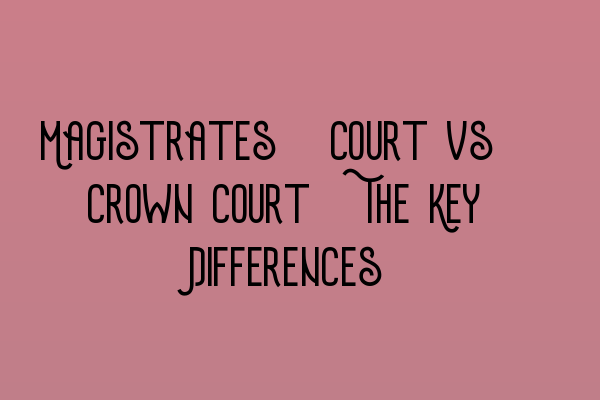Magistrates’ Court vs. Crown Court: The Key Differences
When it comes to criminal trials in the UK, the judicial process primarily takes place in two types of courts: Magistrates’ Court and Crown Court. These two courts play a crucial role in the administration of justice, but they differ in several significant ways. In this blog post, we will explore the key differences between Magistrates’ Court and Crown Court to help you understand the distinction and navigate the legal system more effectively.
1. Jurisdiction
The first major difference between Magistrates’ Court and Crown Court lies in their respective jurisdictions. Magistrates’ Court handles less serious criminal cases, also known as summary offenses. These offenses typically include minor offenses such as petty theft, public nuisance, and traffic violations. Crown Court, on the other hand, deals with more serious criminal cases that involve indictable offenses, such as murder, rape, and robbery.
If you are facing a minor charge, your case will likely be heard in Magistrates’ Court. However, if you are charged with a more severe offense, your case will be automatically sent to Crown Court.
2. Trial Process
Another critical difference between Magistrates’ Court and Crown Court is the trial process. In Magistrates’ Court, trials are conducted by a panel of three magistrates or a single district judge. There is no jury present in Magistrates’ Court trials, and the verdict is determined solely by the magistrates or the judge.
In contrast, trials in Crown Court are presided over by a judge, who is assisted by a jury. The jury, consisting of 12 members of the public, listens to the evidence presented during the trial and decides on the defendant’s guilt or innocence. The judge, in this case, provides guidance on points of law and ensures a fair trial.
3. Sentencing Powers
One significant difference that has a direct impact on the outcome of a case is the sentencing powers of Magistrates’ Court and Crown Court. Magistrates’ Court has limited sentencing powers and can only impose lesser sentences, such as fines, community orders, or short custodial sentences up to a maximum of six months.
In contrast, Crown Court has wider-ranging sentencing powers and can impose more severe punishments, including longer custodial sentences, life imprisonment, and fines without any maximum limit. For cases that originate in Magistrates’ Court but are subsequently sent to Crown Court, the Crown Court has the authority to pass a sentence without any restrictions.
4. Legal Representation
Legal representation also differs between Magistrates’ Court and Crown Court. In Magistrates’ Court, defendants are usually not entitled to legal aid unless they meet specific financial criteria. As a result, many individuals choose to represent themselves or hire a solicitor to appear on their behalf.
In Crown Court, legal aid is more readily available, and defendants are often represented by barristers, who are specialist advocates trained to handle complex and serious criminal cases. The higher level of legal representation in Crown Court reflects the more serious nature of the cases being heard and the potential consequences for the defendant.
5. Appeals Process
The appeals process also varies between Magistrates’ Court and Crown Court. If you are dissatisfied with a decision made in Magistrates’ Court, you can appeal the decision to the Crown Court. The Crown Court, however, does not have the jurisdiction to hear appeals from Crown Court decisions. Appeals from Crown Court decisions are directed to the Court of Appeal (Criminal Division).
Summary
It is essential to understand the key differences between Magistrates’ Court and Crown Court to navigate the criminal justice system effectively. While Magistrates’ Court deals with less serious offenses and has limited sentencing powers, Crown Court handles more serious cases and has broader sentencing powers. The trial process, legal representation, and appeals process also differ significantly between the two courts.
If you are preparing for a criminal trial and want to know more about the legal process, make sure to check out our related articles: SQE Exam Prep: Essential Study Materials for Aspiring Solicitors, Demystifying the Solicitors Qualifying Examination Format, SQE Exam for International Lawyers: Challenges and Success Strategies, LLC Formation Made Simple: Step-by-Step Guide for UK Entrepreneurs, LLC Formation: A Step-by-Step Guide for UK Entrepreneurs. These articles provide valuable insights into various legal topics and can help you in your legal journey.
